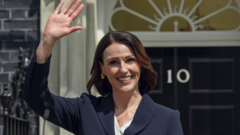Does Playing a Prime Minister Change Your View on Politics?

Suranne Jones stars in Netflix's political thriller, Hostage, where she portrays British Prime Minister Abigail Dalton, whose husband is kidnapped, forcing her to collaborate with French President Vivienne Toussaint, played by Julie Delpy. Together, the leaders navigate high-stakes blackmail during a London summit, addressing themes of power, gender dynamics, and the complexities of modern politics.
Last updated: 26 October 2023 (BST)
Key Takeaways
- Suranne Jones plays a British Prime Minister in the new Netflix thriller, Hostage.
- The show explores the dynamics of female leadership in politics.
- It features themes relevant to current political discourse but is not a direct reflection of today's issues.
- Jones conducted extensive research to authentically portray a politician's life.
- Writer Matt Charman aimed to create a unique narrative around women in power.
Overview of Hostage
Hostage showcases a gripping narrative that delves into the world of politics, focusing on the resilience and complexities faced by female leaders. Suranne Jones's character, Abigail Dalton, is thrust into a dire situation when her husband is kidnapped during a high-stakes summit in London. This scenario compels her to form an unlikely partnership with French President Vivienne Toussaint, portrayed by Julie Delpy, who is also facing blackmail. Together, they navigate the treacherous waters of political intrigue while trying to save Dalton's husband and bring the perpetrators to justice.
Thematic Elements and Real-World Parallels
Although Hostage reflects elements of contemporary political issues, both Jones and Delpy emphasise that the show is not a direct commentary on current events. "We're entertaining and we're in the political world," Jones asserts, adding that connecting the show too closely to reality would be inappropriate. This sentiment is echoed by Delpy, who points out that political contexts shift rapidly, making it challenging to anchor the narrative in any specific moment.
Writer Matt Charman acknowledges that while the show cannot entirely escape the climate of today’s politics, it aims to create a unique storyline that resonates on its own terms. He insists that the narrative is less about mirroring real-world politics and more about exploring the dynamics of power and the personal toll it can take on leaders.
Female Leadership in Focus
A significant aspect of Hostage is its portrayal of female leaders. Charman made a conscious decision to depict both Dalton and Toussaint as women, a choice that he believes enriches the narrative. He explains that exploring the challenges faced by women in power allows for a deeper examination of societal double standards. "What was exciting was the idea of women in power and how we explore that," he explains.
Jones highlights the interesting dynamics that emerge when two female politicians interact. "A female politician is used to dealing with men, so it's interesting to see how it plays out when it's two women," she notes. This perspective contributes to a refreshing take on political thrillers, which often overlook the nuances of female leadership.
Character Development and Research
Jones invested significant effort into understanding the intricacies of political life to portray Dalton authentically. She visited the House of Commons, engaged with political figures, and consumed a wealth of literature and media related to politics. "I'm a bit of a geek when it comes to research," she admits, emphasising her desire to grasp the reality of a life she had previously known little about.
Charman also acknowledges the extensive research that informed the show’s creation, hinting that the characters may draw inspiration from real-life politicians. However, he remains tight-lipped about specific influences, maintaining the confidentiality of those he interviewed. This level of commitment to authenticity serves to elevate the story, grounding it in a reality that resonates with audiences.
The Moral Dilemmas of Politics
One of the central questions posed by Hostage is whether it is possible for politicians to maintain their ideals once they assume office. Charman expresses hope, asserting that it is not inevitable for politicians to abandon their morals. However, he acknowledges the difficulties they face in a system that often prioritises power over principles. "It's definitely tough to keep your morals," he states.
Delpy offers a more cautious view, suggesting that the current political landscape, dominated by extreme voices, makes it challenging for moderate, reasonable perspectives to be heard. "If you're too reasonable you won't be listened to as there's so much noise of both extremes," she explains, highlighting the complexities of navigating political discourse today.
Critical Reception and Unique Narrative Style
Critics have noted that Hostage stands out among political thrillers for its unique storytelling approach. The Guardian described the show as "quite unusual," stating that it does not follow the conventions of other political dramas. It is characterised by a sharp dialogue and a thrilling pace, without veering into the cynicism often associated with shows like House of Cards.
Williams, writing for The Guardian, remarked on the show's ability to maintain a balance between entertainment and thought-provoking content. "It's a little biting but it's not House of Cards cynical," she notes, indicating that Hostage offers a fresh perspective in a genre that can often feel predictable.
Conclusion
Hostage promises to be a compelling exploration of power, morality, and the unique challenges faced by women in leadership. With Jones and Delpy at the helm, the series not only delivers a gripping narrative but also invites viewers to reflect on broader societal issues through the lens of political intrigue. As audiences prepare to engage with this innovative thriller, it raises critical questions about the nature of power and the enduring struggle to maintain one's ideals within the complexities of modern governance.
How will the characters navigate the moral dilemmas they face, and what does this mean for the future of female leadership in politics? Only time will tell. #Hostage #SuranneJones #PoliticalThriller
FAQs
What is the premise of Hostage?
Hostage follows British Prime Minister Abigail Dalton, whose husband is kidnapped during a London summit. She must collaborate with French President Vivienne Toussaint to rescue him and confront the blackmailers.
Who are the main characters in Hostage?
The main characters are Abigail Dalton, played by Suranne Jones, and Vivienne Toussaint, portrayed by Julie Delpy. They navigate the challenges of leadership while facing a crisis involving a kidnapping.
Is Hostage based on real-life events?
While Hostage touches on themes relevant to contemporary politics, it is primarily a fictional narrative. The creators aimed to explore the dynamics of power rather than reflect specific real-world events.
What themes does Hostage explore?
Hostage explores themes of female leadership, the moral dilemmas of politics, and the personal costs of power. It also addresses societal expectations and the challenges faced by women in positions of authority.
What kind of research did Suranne Jones conduct for her role?
Suranne Jones conducted extensive research, including visits to the House of Commons, interviews with political figures, and consuming various media focused on political life. This helped her portray her character authentically.
Published: 2025-08-21 00:35:29 | Category: technology



